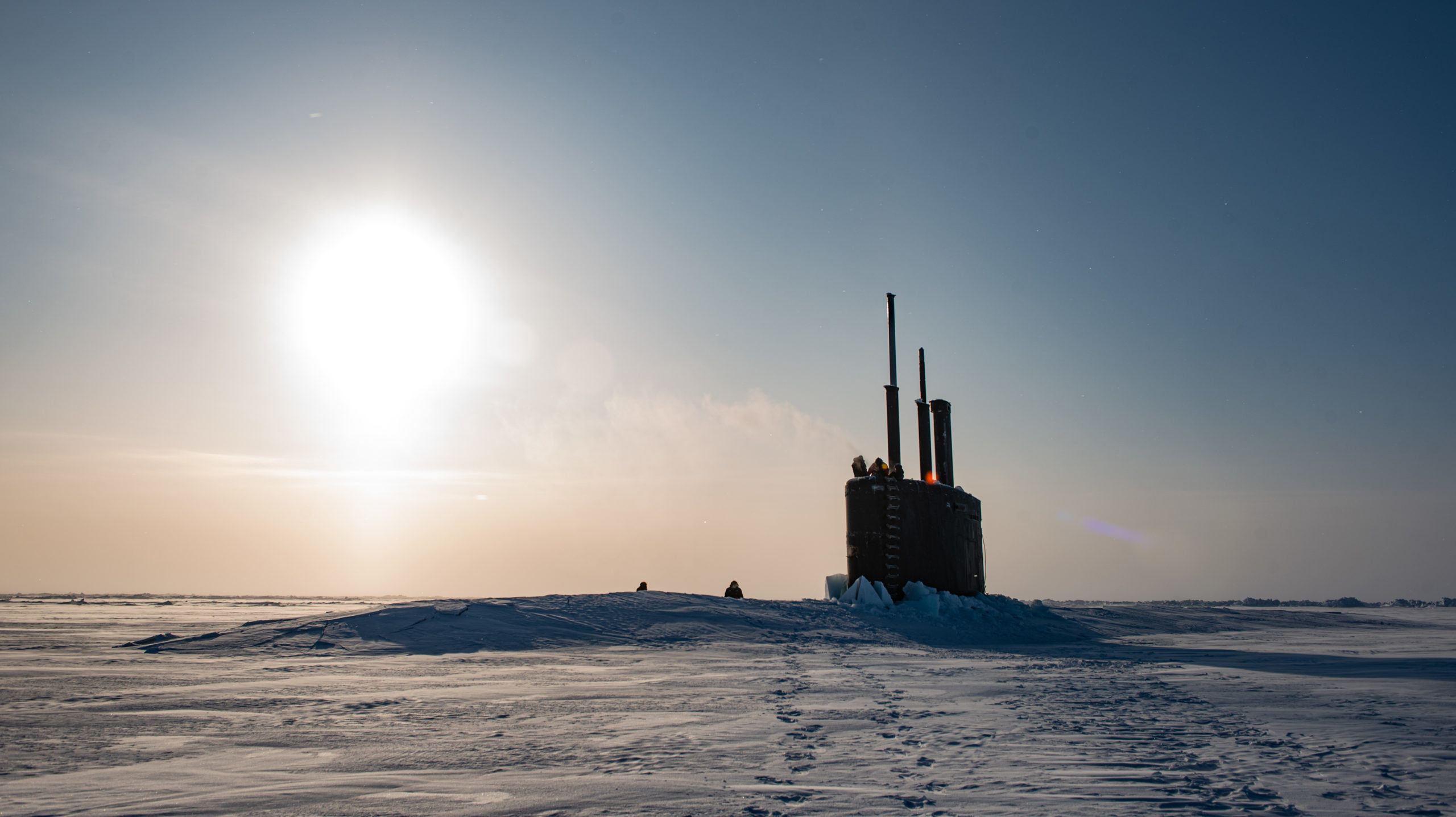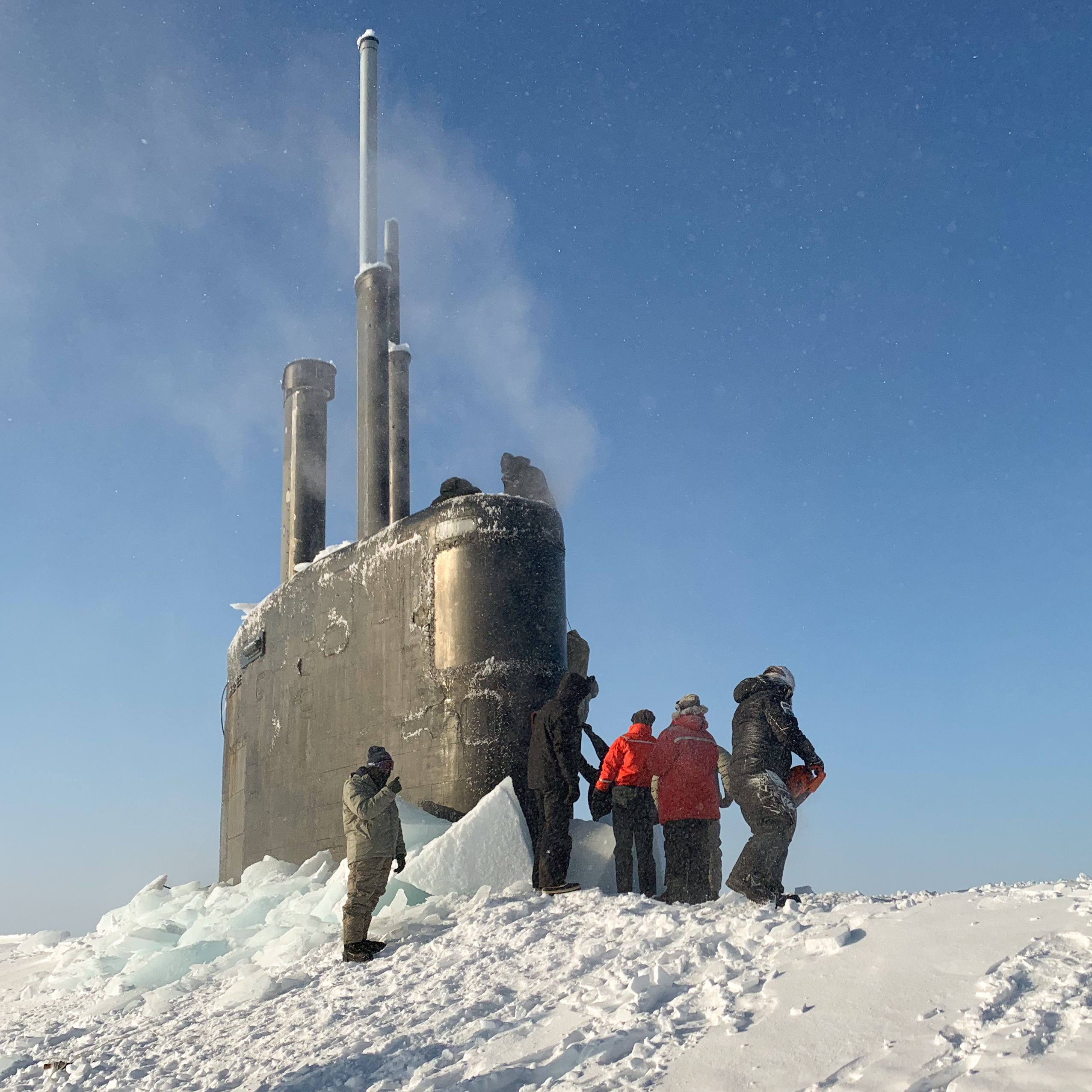U.S. Navy submarines surface near the North Pole as a major Arctic exercise gets underway
The biennial exercise serves as a reminder of U.S. military capabilities in the Arctic, experts say.
ICEX 2020, a multi-national military exercise in the Arctic led by the U.S. Navy, began on March 4 with five nations and more than 100 people participating.
Two U.S. Navy fast-attack submarines will surface near the North Pole over the course of the exercise (see video below of the first of these, the USS Toledo, surfacing on March 4, 2020). The submarines will also conduct several transits through the region.
This year the biennial exercise has been shortened to three weeks; in 2016 and 2018, it took place over five weeks.
The temporary Ice Camp Seadragon is being constructed on an ice floe. It will include a shelter, a command center that will direct ICEX operations, and housing for exercise participants. The camp named for the USS Seadragon, the first U.S. submarine to transit the Northwest Passage in 1960.
In addition to the U.S., participants from Canada, Norway, the United Kingdom and Japan will take part in the exercise.
According to the U.S. Navy, its submarine force has completed about 100 Arctic exercises in total, including exercises like ICEX.
As ICEX was launching, some U.S. lawmakers questioned whether the Navy’s submarine presence is enough in an era they characterized as a great power competition.
Yet experts say the polar exercise helps position the U.S. military as a powerful force in the region and allows the United States to conduct important scientific research.
In a statement on ICEX 2020, Vice Adm. Daryl Caudle, commander of the Navy’s Submarine Force, said that the Arctic is “a potential strategic corridor — between Indo-Pacific, Europe, and the U.S. homeland — for expanded competition.”
Exercises like ICEX, he said, help the Submarine Force stay prepared in the region — including “combat and tactical readiness for sustained Arctic operations in the unique and challenging Arctic environment.”
The Navy expects its submarines to play a large role in Arctic defense for the U.S., Caudle added.
The Senate Armed Services Committee held a hearing about the Navy’s posture in the Arctic on March 3, the day before ICEX kicked off.
In his testimony, General Terrence J. O’Shaughnessy, commander of United States Northern Command (Northcom) and North American Aerospace Defense Command, said, “The changing security environment makes it clear that the Arctic is no longer a fortress wall, and the Arctic Ocean is no longer a protective mode. They are now avenues of approach to the homeland.”
However, the Navy continues to characterize the Arctic as low-risk.
“The immediate prospect of conflict in the Arctic remains low,” said Dr. James Anderson, testifying on behalf of the deputy under-secretary of defense for policy in the Navy.
Sen. Dan Sullivan, a Republican from Alaska, decried the Pentagon’s lack of preparation in the Arctic and criticized the Navy for only deploying submarines in the circumpolar North.
Sullivan has long advocated for a freedom of navigation operation (FONOP) in the Arctic, and he had appeared optimistic one would take place last summer.
“I think it’s great that we’ve got subs up there, but a sub is not a FONOP. You can’t see a sub,” he said. “The whole point of a FONOP is to demonstrate presence.”
Sullivan also pointed to the lack of icebreakers and ice-hardened ships in the U.S. Coast Guard and Navy fleets, the lack of deepwater ports in the American Arctic, and the lack of concrete planning in the U.S. Navy’s anemic Arctic strategy, released last year.
Rebecca Pincus, an assistant professor at the U.S. Naval War College, says ICEX is a reminder that the U.S. Navy does have a strong presence in the Arctic Ocean, as well as decades of experience studying and operating in the region.
“We’re the only country that does this,” she told ArcticToday. She called exercises like this “a really good foot stomp” to show that the U.S. military has “tremendous polar capabilities.”
“We are not being beaten by Russia and China in the Arctic Ocean,” Pincus said. “And this is a really tangible reminder of why not: because we do this.”
Pincus also pointed out that ICEX has been a demonstration of U.S. capabilities and readiness that does not get dragged into international politics.
“Doing a freedom of navigation operation in the Arctic Ocean is a very different kind of operation because it is so political,” she said. It could antagonize nations like Russia and Canada, a key U.S. ally.
In addition to learning how to operate in harsh conditions and demonstrating its presence in the Arctic, Pincus said, operations like ICEX can also facilitate valuable cooperation with international allies and further scientific research.
“Science enables us to understand the present and predict the future,” she said. “When we think about the Arctic as an evolving security domain, being able to understand the present and predict the future is absolutely critical to being able to defend our interests.”


